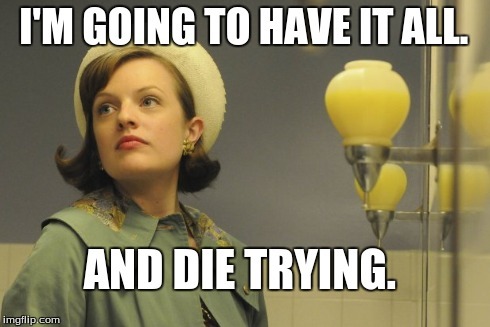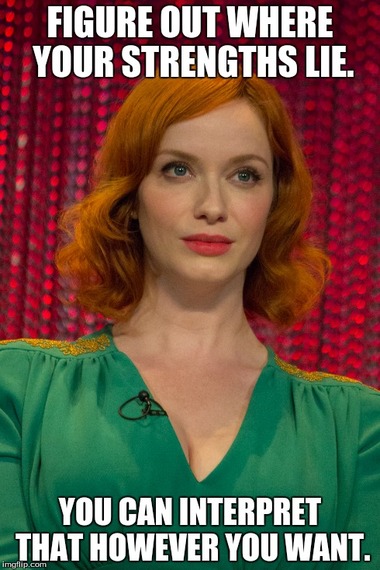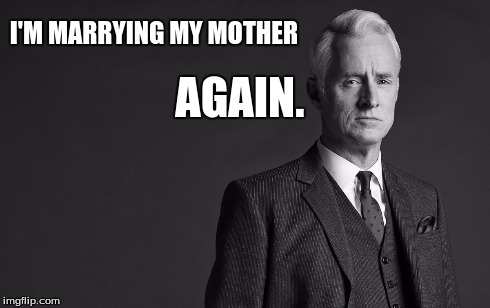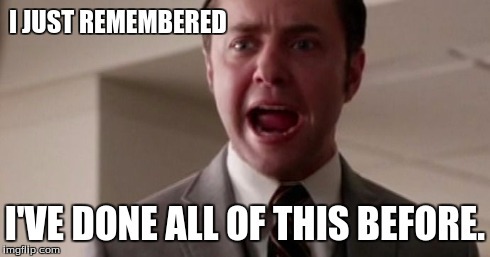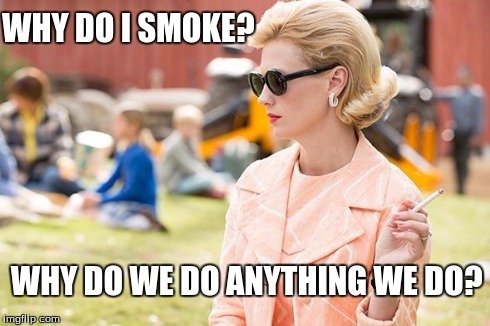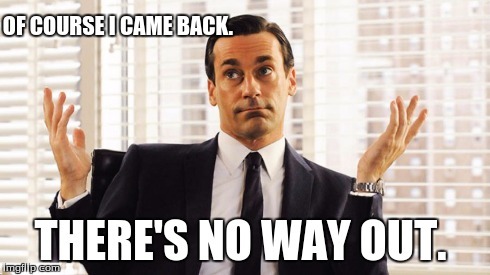I'm sure I wasn't alone in fearing that the Mad Men finale would confound and frustrate the way the Sopranos finale did, leaving us in the dark (literally) as to the fates of the characters who'd been rendered so beautifully and in such a complicated manner over the years that we had come to see them as real people, almost; at least we spoke of them as if we did (cough, okay, turns head slightly away, I did).
As it turned out, AMC's Mad Men finale, was filled with plot twists and payoffs. Yet, it's final moments, which consisted of a cut from Don's enlightened-yogi smile to an iconic Coca Cola jingle, imparted a nearly identical lesson as the final moments of the Sopranos final episode: life will go on, and people don't really change; thus, we can guess that the unwritten future of our favorite fictional characters will end up looking - in all probability - a lot like their past.
Certainly, on a superficial level, we can say that all of the major Mad Men characters journeyed forth through significant life changes. Peggy went from secretary to star executive. Pete got married and had a baby girl, got divorced and moved to California and back, all while losing his hair and bettering his career. Don went from married suburbanite to Park Avenue player. Roger went from name-partner at Sterling Cooper to cartoon-ish figurehead at McCann, along the way ditching his first wife for his secretary, taking LSD and partaking in the free-love offered by the decade. Betty began as the gaslit wife of a rogue advertising exec to the adored wife of a respectable political player. Joan went from head of the secretary pool to head of her own production company.
But as much as these characters gained scars, strength and wisdom through their journeys, none of them actually changed over the course of a decade. Not essentially. Not at their core. The Mad Men finale illustrated this existential reality by bringing the characters full circle to where they were in the very first episode.
Peggy
In the first episode of Mad Men, Peggy was an ambitious young secretary, prepared to do what it took to succeed, including sleeping with her boss. Lucky for her, Don rejected her and came to see talent in her that had to do with neither her body nor her typing skills. If Peggy expressed an interest in getting married, it was never with much enthusiasm. She seemed to drift passively into relationships and then drift out without much drama.
In the finale, Peggy remained true to how we met her - an ambitious still-young advertising executive, prepared to do what it takes to succeed, which in the finale meant putting her ego aside and resolving to battle through the McCann Erickson bureaucracy. Peggy also remained fairly apathetic to the prospect of romance. She said she never thought of Stan. Yet a moment after he professed his love for her, she said she loved him too. So for now, Peggy has found love. Will it last? Does it matter? If it doesn't last, don't we know what will happen next? Peggy will go on and keep striving in her career and accepting love if it happens.
When we first met Joan, she was the boss of all the secretaries and the provocatively-dressed sexpot who was sleeping with the married and much-older Roger Sterling. Joan implied that she was looking for a husband, but her relationship with Roger belied her ambivalence. When Joan did eventually marry, it was to a rapey boor, and the marriage rapidly failed; although Joan's taste in men was questionable, her unwillingness to take abuse was not negotiable. Over the course of the series, we saw that Joan was willing to use her body to get ahead at work - but as it turned out, only where the opportunity was worth it to her. Thus, it was acceptable to Joan to sleep with a client in order to become a partner, but as we later discovered, it was not acceptable for her to sleep with her new boss at McCann in order to merely keep her job.
In the finale, Joan was still Joan. Getting involved with Richard was classic Joan. Wanting to have a fulfilling career was classic Joan. And ditching the prince when it became obvious that he was a controlling jerk was also classic Joan. Will her business be a success? Of course it will - Joan will use her body and her brain to make sure of it. And when a man comes along who is strong enough to capture Joan's heart, he had better be kind and decent, or he'll be dismissed like the ones who came before.
At the outset of the series, Roger was a wealthy philanderer. At the end of the series, Roger remained a wealthy philanderer. Yes, in the finale, he is engaged to marry Marie Calvet, Megan Draper's mom. But at the bistro in the finale, Marie makes it clear that she knows that Roger will never change. She expects a pretty young secretary in a very short skirt to tempt him, and she expects that he will stray. Yet she's mature enough to accept it, French enough to laugh about it, and crazy enough to agree to marry Roger anyway. Basically, Roger has married his first wife all over again, only this time, the wife knows what she is getting into before she says "I do." Will that make a difference? Perhaps. Perhaps not. Either way, Roger will remain the wealthy philanderer that he's always been.
As for his career, yes, Roger began as the head of Sterling Cooper, and he was productive back then. By the series finale, Roger is nothing more than a figurehead with a four-year contract. But does this change who Roger is? For Roger, who came into advertising independently wealthy, business seemed more of a hobby than a driving force. And whether the hobby consisted of deal-making or drink-making, as long as he has an office to go to, he's still the Roger we met on day one.
Pete was introduced to us as smarmy, ambitious, lucky to have a job in sales given the his rudimentary people skills and lucky to have the love of Trudy, his then-fiance and later wife (and ex-wife), who was Pete's greatest asset when it came to closing with clients. But Pete's luck wasn't without limits. His affair with Peggy resulted in a baby boy he never got to meet. His clumsy attempt to philander his way through his marriage's dull moments - as Don and Roger did so deftly most of the time - resulted in humiliation and divorce.
Finale-Pete was really just a more grown-up version of Pilot-Pete. Pete was still smarmy, ambitious and lucky. And Pete was still smart enough to know that Trudy was and always would be his greatest asset. And finally, Pete quietly accepted the karmic punishment for his good fortune - in landing the Lear job, which he hadn't been seeking and for which he didn't even show up for his interiew, and for getting Trudy and his daughter Tami back. That punishment was leaving New York City and having to live in Wichita. Different landscape, but same Pete.
Betty spent most of the Pilot unseen. When we did meet her, she was the beautiful suburban wife of the dashing, cosmopolitan Don Draper. If Betty suspected Don's infidelities, she pretended otherwise. When Don sensed that Betty was beginning to sniff out his secrets, he sent her to a shrink and had her doubting her sanity. When Betty realized that Don wasn't who he made himself out to be, she didn't stay for the drama. She moved on. Betty was never a model mother, but she was present. She cooked, she cleaned, she was reliable, and she was a mother bear with a rifle and a dangling cigarette when the situation called for it.
In the finale, Betty is still beautiful, still suburban, and still a wife. She's still not honest with herself or with her children. She's still not particularly nurturing. Still unwilling to engage in drama of any kind, Betty has rejected treatment for her lung cancer and is growing sicker by the day, but she remains present and protective of her children, telling Don that he can't come home because it would alarm the children. Still smoking, still vain, still facing away from Sally in the last moments in which we see her in the finale, Betty is every bit the Betty that we met in the first season of Mad Men.
Don
Don Draper was always looking to escape. He escaped his past as Dick Whitman by taking on the identity of Don Draper. He escaped his first marriage to Betty through his lies and his many affairs. He escaped his second marriage to Megan by sending her off to California and then essentially disappearing from her life. He escaped from his life on various occasions, so often, in fact, that his colleagues remarked in the finale that disappearing is "what Don does."
But what Don Draper also does is come back.
Whether out of a sense of responsibility or a desire to escape from his escape, Don always comes back. So, in the final few episodes, Don is "on the road", as he puts it. Ditching his lunch meeting, his contract with McCann and his weekend visits with his kids, Don was finally going to escape the guilt-ridden identity he had crafted to escape the shame-ridden identity into which he'd been born.
Except he realized that he couldn't. He was still having nightmares about being outed as Dick Whitman; on the other hand, he couldn't shake his "Don Draper" persona either. The realization that escape simply isn't possible was nothing new for Don. It was a theme throughout the series. And it brought the series into the nebulous future as Don, finally settling into his new-agey yoga retreat smiles beatifically at what can only be his next "big idea": I'd like to teach the world to sing in perfect harmony.
Finale-Don may have learned to cry. He may have learned to show empathy. He may have finally figured out that the young folk don't really want his help, although they do like his money. But Don is really no different from the Don we met in the Pilot. Don escapes, and Don comes back. He's a chronic Sisyphus, pushing the boulder up the hill and watching it roll back down.
Don escapes, and Don comes back. Now, if only Mad Men would come back. I for one would be thrilled to have another seven years to see these characters go on a journey that ultimately leaves them the same as when they began. Really, I would.
